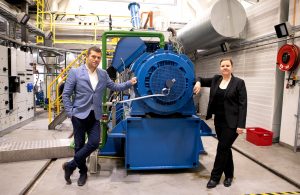[University of Vaasa] – The Clean Propulsion Technologies project consortium, led by the University of Vaasa, aims to develop radically new solutions for clean and efficient marine and off-road transport – a Finnish response to tightening emission legislation and growing global competition in these segments. Business Finland has granted research funding for six research organizations and nine companies to bring these new propulsion solutions from the research phase to real-world application.
“The common goal is to secure the position of global technology leader for the Finnish powertrain industry by creating a common vision and sustainable business solutions,” says Associate Professor Maciej Mikulski from the University of Vaasa. Mikulski acts as the responsible leader of the Clean Propulsion Technologies project.
The research organizations and companies develop the most promising, innovative powertrain technologies for new products. These developments will secure compliance with emission and greenhouse gas regulations in both marine and off-road transport segments by 2035. In the long term, the goal will be achieved by developing a common technological roadmap for both sectors. The roadmap provides a consolidated plan for how to secure this compliance by 2050.

Associate professor Maciej Mikulski and development manager Merja Kangasjärvi, University of Vaasa in the VEBIC energy laboratory. ©_University of Vaasa
The most significant technological highlights of the expected project results are a groundbreaking medium-speed engine working in fuel-flexible RCCI (Reactivity Controlled Compression Ignition) mode and a high speed, hydrogen-fueled engine concept. The research will further focus on developments in advanced aftertreatment, hybrid propulsion technology and predictive powertrain control. The whole package forms an environmentally, socially and financially sustainable business model.
Business Finland has granted a remarkable EUR 7.9 million in funding for the Clean Propulsion Technologies project. “We foster the competitiveness of Finnish companies and bring together key players within the smart energy ecosystem to develop new solutions,” says Esa Lindqvist, Ecosystem Lead, Business Finland. “The consortium project is a great example of a well-planned improvement to combustion and hybrid technology, which aims to make a leap in environmental improvement in the area of marine and off-road transport. Additionally, it offers a great opportunity to strengthen cooperation with common objectives between Finnish maritime, off-road companies, and research centers.”
According to Mikulski, the project is a first-ever collaboration of this magnitude between Wärtsilä and AGCO Power, two leading powertrain equipment manufacturers in Finland. This unique backbone, strengthened by the expertise of all project partners, tackles the growing global competition in these market segments.
“Developing concepts together within the Engine Research Initiative ecosystem and with other technology leaders is the most efficient way to find solutions including combustion engines for a sustainable and decarbonised future,” say Christer Wik, Laboratory Manager, and Lauri Pessinen, Project Controller, from Wärtsilä.
Finding new, effective, and clean solutions is also the key issue for AGCO Power. “This project strongly supports AGCO Power’s new technology research for a sustainable low-carbon future. The project also establishes a Finnish research network in this technology area,” points out Kari Aaltonen, Director R&D from AGCO Power.
CPT consortium consists of six research organizations (University of Vaasa, Aalto University, Tampere University, Åbo Akademi University, VTT Technical Research Centre of Finland and Lappeenranta-Lahti University of Technology LUT) and nine companies (Wärtsilä Finland, AGCO Power, Meyer Turku, Napa, Dinex Finland, Proventia, Geyser Batteries, Bosch Rexroth and APUGenius).
The total project volume is approximately 15 million euros, out of which E7.9 M comes as Business Finland support. The companies and universities themselves fund the rest.





